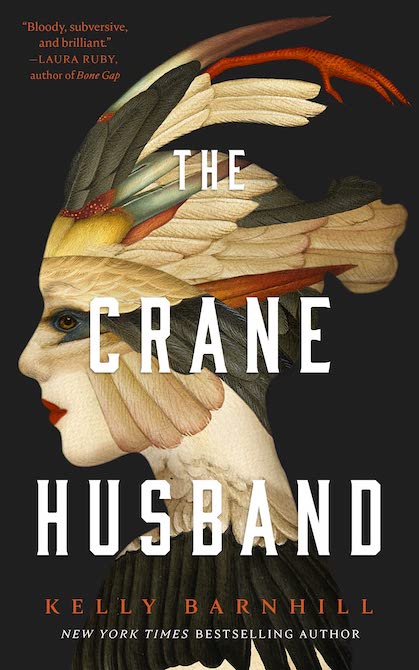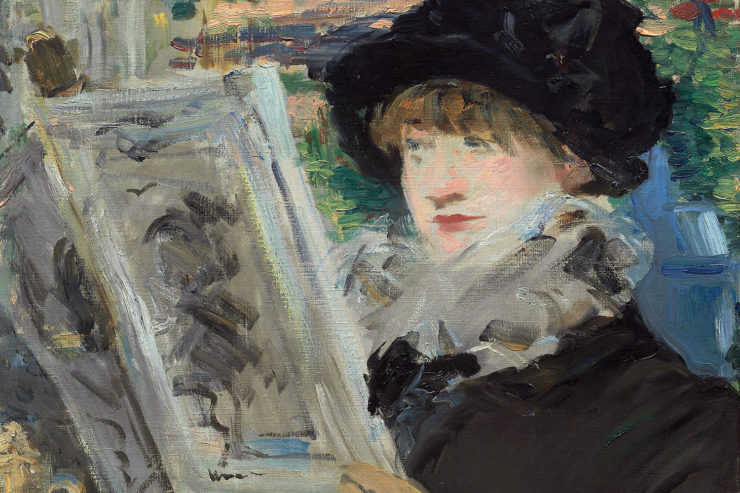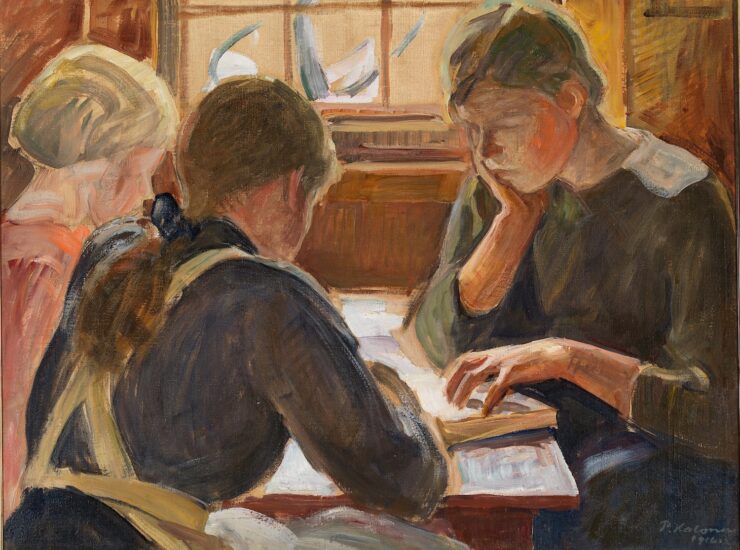What I remember best are the textures. The tan naugahyde chair, already old and worn, eventually sacrificed to several generations of kitten claws. The crumble of graham crackers and the coolness of a glass of milk. The way some pages were smooth and some were bent, some covers crisp and some worn. The books were overly large, floppy, awkward for small hands. I made it work.
My first reading memory is this: getting up before the adults in the house to read Tintin comics in the comfiest chair, a perfectly sweet snack at hand. It was a moment of independence born of the grown-ups’ desire not to be awakened at dawn by a small, story-hungry child. Once I had gotten through all the Tintins in the house, I read and re-read the same books, picking whatever I felt like, fully immersing myself in rocket launches and marveling at giant mushrooms.
In some ways, I’m probably always looking for this experience when I read: Immersion, independence, solitude, comfort. But the way we read changes, we grow and age, just as what we read does—though I think it’s safe to say we don’t talk about it quite as much.
I’ve been thinking about how we read thanks to—as is predictable—some of the things I read. Anne Helen Petersen’s newsletter Culture Study led me to this conversation between Ezra Klein and Maryanne Wolf, author of the book Reader Come Home: The Reading Brain in a Digital World. The conversation is from last month; the book is from three years ago. I read the transcript of the interview because I can’t focus on podcasts without something to do with my hands, and I have yet to plan out a new cross-stitch. But I will read just about anything, anywhere, even if it’s while I’m slouched on the sofa with my laptop when I should be headed to bed.
These are all how details, but they’re not the details Wolf talks about most here; she’s talking more about how we read on paper versus on screens, how there’s deep reading and skimming and those are not the same; and, refreshingly, how those are both useful skills. It can be hard to talk about some of the technological changes in how we read without veering toward sounding like a technophobe who thinks social media is going to render us unable to read Dickens. That’s not helpful. Screens aren’t going away, and Wolf is not here to lecture us about them.
What she is here to talk about is how it is different. “The affordances of the digital screen are really exciting. They help us skim the extraordinary voluminous nature of information that’s out there. Skimming is a defense mechanism that’s very useful. We can handle so much information,” she says. But it’s not the same as reading print: “The print mediums affordances advantage the giving, the allocation of time to words, concepts in a way that when we skim we simply don’t have the same amount of time to process.”
There is a ton of good stuff in this interview—about attention, habits and mindsets, what we choose to give attention to and what we skim, what we read with intention and what we don’t, and how to build reading into your day. And it made me think about how it’s not just what and how we read in terms of screens versus books, the internet versus novels, six-paragraph blog posts versus deep-dive nonfiction tomes. It’s about the role reading plays in our lives, and how and why we make time for it.
Again: It can be hard to get into these topics without sounding prescriptive, maybe even pedantic. But I think it’s worth thinking about why we do just about anything we do, including—maybe especially!—the things we love best. Is reading a habit? A hobby? Is it something you do because it feels like it’s good for you or because you feel like you should? Is it an escape or an education? A lesson or a doorway?
It’s probably all of these things. It’s a skill, when we’re small, and a vital one. It’s a subject in school, where we have to read things we might not otherwise have chosen for ourselves. (High school me would certainly not have picked Of Mice and Men from the Steinbeck catalog. But I still think about Bradbury’s “All Summer in a Day” all the time.) It’s even more of a focus in college, especially for all those English majors (and variants) among us. Maybe it first becomes work in primary school, maybe not until grad school. But there might be a point when you don’t want to read another word, or don’t have time for what you really want to read, or lose the will to pick up a book unless absolutely necessary.
One hopes that feeling is temporary. But I don’t remember reading for fun in college—except in the summer, when I worked briefly at a Barnes & Noble and took advantage of my employee discount (or, more likely, went to the Strand for something used and cheaper).
Reading is like an old friend, the kind who comes and goes in your life but, if you’re lucky, your conversational thread picks right back up where you left it every time you see each other. Its presence in your life might wane when things get busy—new job, new relationship, new family members—and peak when it’s cold and dark and you decide that it’s time to read The Lord of the Rings again but get distracted by a bunch of other books about people trekking through the mud and rain and are down fourteen different rabbit holes that all started when you Googled “best winter books list.”
But these days, you’re probably still reading, even if you’re not reading-reading in the bookish sense. Instagram captions are reading. Transcripts of long New York Times podcasts are reading. I have “reading” on my to-do list most days, because I like checking the little ticky-box of things I am likely to accomplish. But only recently did it occur to me that, really, the “reading” task doesn’t have to mean books.
Does that feel like cheating? Sometimes. But that Anne Helen Peterson newsletter and the resulting comments on it made me think a lot about 2020 and how reading books felt in that strange year. Some people just quit reading; some read more than ever. Me, I couldn’t read fiction. Life had no narrative shape and I resisted it in books, turning to nonfiction and occasionally poetry for something that would take me away, distract me, let me think about other lives and other places and, crucially, other times. Also, I read a lot of horrible things on screens.
Buy the Book


The Crane Husband
2020 simultaneously feels like it was a decade ago and like it was last week. Really, it wasn’t that long ago, and it changed us—and continues to change us—in ways that probably won’t be fully apparent for years to come. How those isolated months might have changed our reading habits, in the grandest of scales, is a small-potatoes question. But it also isn’t, in the sense that when you add up a lot of habits and loves and wishes and desires and passions and hopes and the many varied ways you spend your time, you get a life. When part of that is reshaped, even a small-seeming part, it echoes.
Sometimes, now, reading feels indulgent. This time I can spend with a book in hand, a warm or strong beverage, a cat on my lap or my elbows resting on a picnic table outside a bar. What simple, perfect luxury. Other times, it feels like a job. (When that happens, I take it off the to-do list.) In 2020, even when I wasn’t reading my usually beloved novels, reading felt like a lifeline. I read emails, tweets, slack jokes, messages from friends, texts, DMs, articles, books, captions, newsletters, yet more newsletters, there are now so many newsletters; I joined my first Discord and had in-depth conversations about Animal Crossing; I took an online class and read my classmates’ work.
All of that is reading.
What I am trying to say here—what I took from that podcast transcription; what I hope I will find in Wolf’s book when I get my hands on it (until the year ends, I am only reading books I already own!)—is that it isn’t either/or, books or screens, Proust or doomscrolling. But maybe, when what you’re reading isn’t serving you, it’s worth stopping to think about why that is. Sometimes it’s the endless skimming scroll of moments from a million people’s lives. Sometimes social media only makes me want to shriek I didn’t need that in my brain! at the top of my lungs. But sometimes I’m reading a book and I’m not really present, not really in it, and is that any better?
It’s the end of the year, a time of lists, contemplation, rankings, judgements, tallies. Let yourself off the hook. If you thought you should’ve read something, should’ve gotten offline, should’ve done this or that or seventeen other things? Maybe just think about screens and books and what you want to put into your brain and what you wish you could take out, and decide what you want to do right now, right here, with the time that’s been given to you.
Molly Templeton lives and writes in Oregon, and spends as much time as possible in the woods. Sometimes she talks about books on Twitter.














